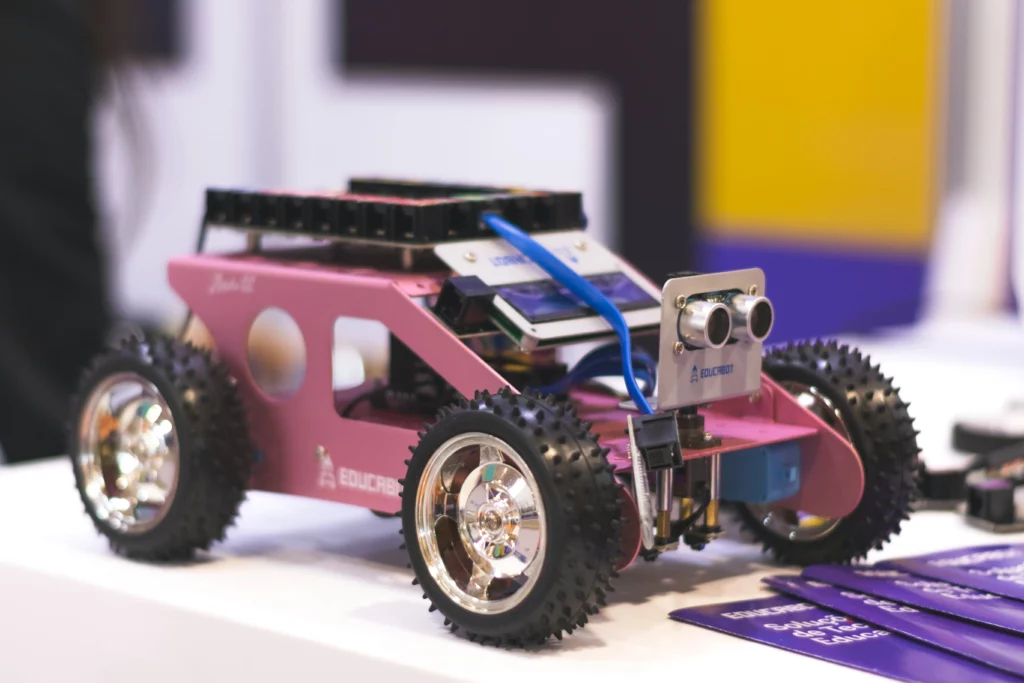
Do you want your child to be interested in the exciting world of robots? Teaching them about robotics at a young age can help them think critically, solve problems, and get excited about STEM topics. In this blog post, we’ll talk about some exciting ways to get your child interested in robots. Let’s get started on this fun learning adventure!
Start with what you know:
Start by telling them in simple words what robotics is. Robots are machines that can do things on their own or with help from a person. Use robot vacuum cleaners or drones as examples to show how robots can help us in our everyday lives.
Hands-On Activities:
Get your child interested in robots by giving them hands-on activities that bring the ideas to life. Start with things like building blocks or LEGO sets that can be used to make simple robots. Help them learn the basics of structure and movement by letting them try out different designs and ideas.
Robotics Kits and Toys:
Buy robotics kits or toys that are right for your child’s age and offer an organized way to learn. Most of the time, these kits come with directions and parts for putting together and programming robots. With these toys, your child can learn about coding, sensors, and basic electric circuits in a fun and hands-on way. Bee-bot is a simple robot for young children that introduces very basic concepts of computer coding. Read more about Bee-bot here: Teaching Elementary School Kids Coding with Bee-Bot – Edthings.com
Robotics Clubs and Classes:
Look for robotics clubs and classes in your area that are geared toward kids. These programs offer chances to learn by doing, to work as a team, and to solve problems. Your child can work together with other kids, compete, and learn about more advanced robot ideas.
Online Resources and Apps:
Check out websites and apps that teach about robotics and offer engaging lessons, tutorials, and games. Websites like Code.org, Scratch, and Tynker offer interactive projects and animations that kids can use to learn about programming and robots.
Science Museums and Exhibits:
Visit science sites and exhibits with robotics displays. Your child can see robots in action at these interactive shows, which will spark their curiosity and creativity. Some museums even have classes or shows about robots.
Books and Videos:
Get people to read about robots and watch videos about them. Look for books that are right for your child’s age that talk about robots or have robot figures. Also, websites like YouTube have many kid-friendly feeds that show robotics projects or explain the science behind robots.
Encourage Problem-Solving:
Give your child robotics-related tasks to get them to think critically and figure out how to solve problems. For example, you could ask them to make a robot that can pick up things or a puzzle that a robot can get through. Encourage them to come up with ideas, try them out, and learn from what doesn’t work.
Conclusion:
Getting your child interested in and excited about STEM topics is a great reason to introduce them to robotics. You can get them interested in robotics and get them excited about technology and innovation by giving them hands-on activities, robotics kits, educational tools, and real-world experiences. Make sure it’s fun and interactive, and let them discover and try things out at their own pace. Who knows, your child could grow up to be an engineer or inventor in robots!
So, get ready to get your hands dirty, gather the tools, and start this exciting journey of teaching your child about robotics. Watch as their eyes light up with wonder as they learn about all the things they can do with robots. Enjoy your job!

